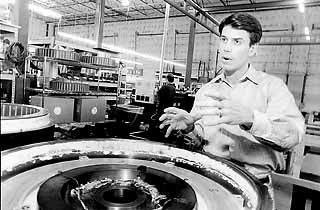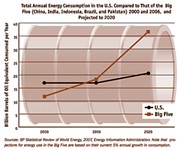Power Surge
Active Power Spins for Profits in a Surging Industry
By Robert Bryce, Fri., Feb. 9, 2001

Looking at the financial statements, an outsider might assume that Joe Pinkerton's company is just another dot-com disaster waiting to happen. Although Pinkerton's company, Active Power, has a market capitalization of about $900 million, it has yet to turn a profit. It's burning through cash with increasing velocity, and even its staunchest boosters acknowledge that it won't make a dime in profit until the second half of next year at the earliest.
Looking at Pinkerton won't provide much assurance to an outsider, either. Just 37, Pinkerton could easily pass for 25. And like many other high tech entrepreneurs of his generation, Pinkerton is suddenly Big Rich -- at least, on paper. On August 8, Pinkerton's company went public and his stake in Active Power is now worth about $150 million.
But initial appearances -- both financial and physical -- can be misleading. Pinkerton is no fly-by-night dot-com wonderboy. Sure, his company could still crater. But Active Power is built on more than promissory notes and pie in the sky. Indeed, Active Power's product, a flywheel-based uninterruptible power supply (UPS) system, may be the coolest piece of commercial high tech hardware ever developed in Austin. While that won't assure it of success, Active Power (www.activepower.com) is targeting a rapidly growing market for power quality products with a revolutionary machine that has several advantages over the technology that it will replace.
Pinkerton, along with David Clifton, Active Power's vice-president of advanced development, invented a flywheel-based power system that may help fill a void in the booming electric power quality market, a sector the company says is worth some $11 billion annually. Power quality is one of the hottest niches in the high tech business. And it's not just in California. Internet service providers, data centers, high tech manufacturers, television stations, long-distance carriers, carpet makers, and lots of other businesses must have highly reliable power supplies. They cannot afford to do without electricity for even a few minutes per year.
Gets the Lead Out
For decades, sensitive data operations have only had one choice when they wanted to keep the juice flowing: large numbers of lead-acid batteries. But batteries have many drawbacks. They are heavy, take up lots of space, are difficult to test, have to be replaced on a regular basis, and contain materials that require special handling, like sulfuric acid. Active Power hopes to steal market share from the battery makers with its system, which uses a solid, 600-pound disk of high carbon steel that spins at 7,700 revolutions per minute while floating on magnetic bearings inside a vacuum-sealed steel shell. Active Power holds numerous patents on the design, which they claim wastes less power, uses less floor space, and lasts longer than similar battery-based UPS systems.
The breakthrough technology in the machine is the magnetic bearing developed by Pinkerton, who holds a B.A. in physics from Albion College. For decades, engineers have been developing increasingly sophisticated bearings that reduce the amount of friction and heat in devices that rotate at high speeds. Steel ball bearings are cheap, but they are heavy, need lubrication, and wear out quickly when exposed to extreme heat and pressure. Ceramic bearings are light and can withstand high heat, but they, too, wear out. Pinkerton's design replaces those bearings with a magnetic cushion that allows a device to spin at high speeds without actually touching its opposing surface. That friction-free design allows Active Power's flywheels to run continuously for up to five years without any maintenance.
In 1992, after Pinkerton saw that his design could be commercialized, he formed a company, Magnetic Bearing Technologies. In 1995, with encouragement from venture capitalist and former chairman of Tivoli Systems Eric Jones (who is now Active Power's chairman), Pinkerton focused his magnetic bearing technology on flywheel-based power quality machines. In 1996, Pinkerton raised a total of $3.75 million from three venture capital firms: SSM Ventures (where Jones is a partner), Austin Ventures, and Boston-based Advent International.
So far, the venture capitalists have been proven right. Active Power's UPS units are now being used all over the world, including high-profile places like ABC-TV and the U.S. Air Force Space Command Center. They are also being used in more mundane applications like manufacturing and Web hosting facilities. In November, the company filled its largest order to date when it shipped 51 of its UPS units -- at a cost of about $30,000 apiece -- to French semiconductor manufacturer STMicroelectronics.
When a power surge, sag, or outage occurs, the Active Power system uses the kinetic energy of the flywheel to keep the power flowing. In case of a power outage, the flywheel system can provide enough power to light 250 average homes for about 12 seconds -- enough time, says the company -- for a backup generator to switch on and begin producing electricity. When used at less than full power, the flywheel can provide power for longer periods.

To distribute and market its systems, Active Power has joined forces with Caterpillar Inc., the mining and construction equipment giant, which sells the company's flywheel systems under the Caterpillar brand name. Although Active Power also sells systems under its own brand, the alliance with Caterpillar allows customers to purchase their UPS and their backup diesel generator set from one vendor. It also gives Active Power immediate worldwide sales, distribution, and maintenance capability. "To the extent that they can simplify the solution and offer a turnkey solution, the alliance with Caterpillar is an advantage for Active Power," says Hugh Holman, an analyst with CIBC World Markets, which has a buy rating on the company. CIBC provided underwriting for Active Power's initial public offering.
Market Friction
Not everyone on Wall Street is so bullish. Whitney Tilson, the managing partner at New York City-based money management firm Tilson Capital Partners, included Active Power on his list of stocks to avoid in a recent column he wrote for The Motley Fool. He included the company in his group of "money-losing companies that have extreme valuations, often due to excitement over some type of emerging technology."
Active Power is one of more than a dozen energy-related companies that have gone public in the past year or so. Others include another flywheel-based UPS maker, Beacon Power, and fuel cell makers like H Power and Proton Energy Systems. Active Power is one of several companies that could flourish -- or founder -- as more states deregulate the electric power industry. Just as the deregulation of the telephone industry created new markets for products and services, the deregulation of electricity should allow new companies to flourish. But as shown by the situation in California, power deregulation also brings questions about power availability and power quality. Electric power shortages in some areas of the country are leading several high tech companies to consider building their own small-scale power plants in case the main power grid fails. Those uncertainties in the grid, combined with the growing use of microprocessors, are forcing companies to take steps to assure that they have highly reliable power. Active Power is capitalizing on that demand.
To meet demand for its systems, Active Power is expanding its production capacity ten-fold, and it expects quarter-on-quarter growth of 50% to 100% for each of the next five quarters. So far, the company appears to be on track. Last month, it reported fourth-quarter revenues of $2.7 million, almost six times the $470,000 in sales recorded in the same period in 1999. In 2000, overall sales totaled $4.9 million, a 364% increase over 1999. But at the same time, the company's net losses are also increasing. During the fourth quarter, Active Power lost $6.3 million, compared to a net loss of $5.5 million in the last quarter of 1999. Overall losses for 2000 totaled $23.1 million, more than double 1999 losses of $10.2 million.
Those losses concern investors like Tilson. "The technology seems cool, but there are tons of long-established alternatives," he says. "This is a company that had no business coming public at this early stage, but it was in a hot sector, so the backers (a very blue-chip group to be sure) were able to get the IPO done -- to the detriment of the public, who have gotten burned so far."
Few stocks have been as volatile as Active Power's. Shortly after it went public, the company's stock soared to over $79. A couple of months later, it swooned to below $13. On some days, the stock may rise or fall 16% or more even though the company's condition has not changed at all. The stock is currently trading at about $20 a share. Over the past few months, Pinkerton has seen his paper worth fluctuate from over $530 million to a paltry $89 million. "It's been a fun ride," he says with a laugh.
For now, Pinkerton and his fellow directors at Active Power don't have to worry about the stock's gyrations. At the end of the year, the company had cash and investments worth $146.2 million. That cash cushion should insulate the company for the next couple of years. But Active Power faces serious challenges. Increasing output ten-fold would present problems to any manufacturer. A ten-fold increase in production of a complex product like the ones made by Active Power is fraught with pitfalls. For instance, production schedules could fall behind due to lack of manpower, or they could be slowed if suppliers cannot produce critical parts fast enough. And as shown recently, stock investors are reacting quickly and cruelly whenever a company gives disappointing results.
Pinkerton doesn't expect Active Power to disappoint. And he believes the recent slowdown in Austin's tech sector may help Active Power as it works to hire and train the 100 or so workers it will need to ramp up production. "We offer an attractive package," he said. "We are a public company. We have tons of money. We are doubling sales every 90 days and we have a product that serves a real market. People want to work with us."
While he admits that increasing production ten-fold will be challenging, Pinkerton says the company has an advantage because it doesn't manufacture its own components. Instead, it is following the model used by another Austin tech company, Dell Computer Corp., which relies on outside vendors to supply its components. Outsourcing allows the company to focus its manpower on assembling and testing its units. Taking the Dell comparison a bit further, Active Power will soon move into a 130,000-square-foot facility near Braker Lane and Metric that was formerly occupied by Dell.
Austin's Next High Tech Magnate?
Whether Pinkerton will become the next Michael Dell remains to be seen. Clearly, the market for Active Power's UPS systems is nowhere near as large as the market for personal computers. And Pinkerton is hedging his bet. Last month, he filed a notice with the Securities and Exchange Commission, saying he would sell 250,000 shares of Active Power (of the 6.79 million he owns). The sale should net him about $5 million.
The money is "great," says Pinkerton with a smile. "But it's not a real focus for me. In terms of family financial security, I mean, it's great to not have to worry about that. It allows you, I think, to better focus on the business." So far, the money hasn't gone to Pinkerton's head. Married to former local TV reporter Claire Radecky, Pinkerton has remained largely anonymous in Austin. He hasn't been active in many civic programs or political causes. And unlike Dell and some of the other tech hotshots, he's not living large. He and Radecky share a house in Northwest Austin that the Travis Central Appraisal District values at $218,000.
But if Active Power is able to hit its manufacturing goals and continue growing, it could become one of the hottest players in the energy sector, and Pinkerton's anonymity will be a thing of the past. Later this year, the company will begin shipping another product. It's a flywheel, electric generator, and gas-fired turbine combined into one compact package. Capable of generating six kilowatts of power (enough for six homes), the machine was designed for use in cellular base stations, a market that is exploding thanks to the growth in wireless communications. As with its other, larger flywheel product, Active Power will be competing for business in the sector with companies that make and market lead acid batteries.
Pinkerton is bullish. The electric power business, he says, is "a trillion-dollar industry. And people are now demanding innovative technology for the first time in 70 years." If Active Power continues to innovate and perform, a good portion of that industry could be theirs. ![]()
Robert Bryce, formerly a Chronicle staff writer, is now a senior writer for Interactive Week.
Got something to say on the subject? Send a letter to the editor.








